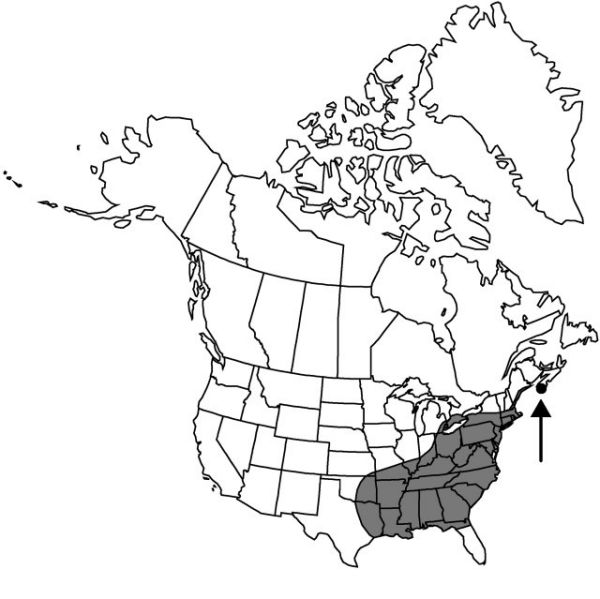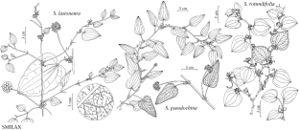Smilax rotundifolia
Sp. Pl. 2: 1030. 1753.
Vines; rhizomes linear. Stems perennial, climbing, branching, terete to quadrangular, 5–6+ m × 6 mm, woody, glabrous; prickles green with dark tips, stout, to 12 mm. Leaves deciduous to evergreen, ± evenly disposed; petiole 0.5–1.5 cm; tendrils numerous; blade variable, bright green, drying to pale to brownish green, usually ovate to broadly ovate, with 3 (or 5) ± prominent veins, 4–17 × 4–16 cm, lustrous, not glaucous, glabrous abaxially, base cordate to rounded with acute insertion at petiole, margins entire, apex abruptly pointed. Umbels numerous, axillary to leaves, 5–12(–20)-flowered, open to dense, hemispherical to spherical; peduncle to 1.5 cm, longer or shorter than petiole of subtending leaf. Flowers: perianth pale yellowish green to bronze; tepals 3–4 mm; anthers shorter than to ± equaling filaments; ovule 1 per locule; pedicel 0.2–1.5 cm. Berries blue-black to black, globose, 5–8 mm, glaucous. 2n = 32.
Phenology: Flowering Apr–Jun.
Habitat: Dry to moist, sometimes riparian woods, borders, hedgerows, thickets
Elevation: 0–200 m
Distribution

N.S., Ont., Ala., Ark., Conn., Del., D.C., Fla., Ga., Ill., Ind., Kans., Ky., La., Maine, Md., Mass., Mich., Miss., Mo., N.H., N.J., N.Y., N.C., Ohio, Okla., Pa., R.I., S.C., Tenn., Tex., Va., W.Va.
Discussion
Normally, the peduncle of Smilax rotundifolia is about the same length as the petiole of the subtending leaf. In exceptional cases, the peduncle may be considerably longer, thereby making this widely distributed species difficult to distinguish from S. bona-nox and S. tamnoides. It lacks the marginal cartilaginous band found on the leaves of the former species and the hispid prickles of the stem of the latter. Specimens of S. tamnoides lacking prickles may be distinguished by their more strongly ridged stems.
Selected References
None.
